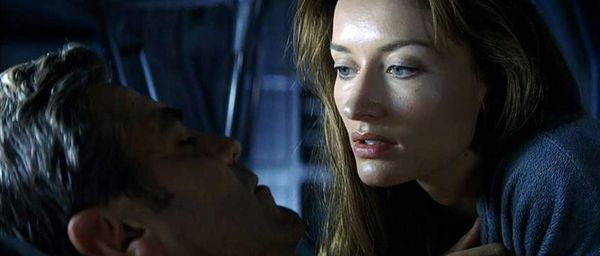Eye For Film >> Movies >> Solaris (2002) Film Review
Solaris
Reviewed by: Tony Sullivan

In 1972 Russian director Andrei Tarkovsky brought Stanislaw Lem's novel Solaris to life. Some three decades later Steven Soderbergh, the director of this American remake, is on record as having described his version of Solaris as a cross between Last Tango In Paris and 2001: A Space Odyssey.
The central story of a space shrink sent to investigate why the occupants of a space station have all gone loco is common to both versions, as is the planet, called Solaris, and its penchant for bringing to life the crew's memories and/or dreams and/or nightmares.

This is not an uncommon science-fiction theme - Forbidden Planet was resurrecting "monsters from the id" back in 1956, while Event Horizon turned the theme into out-and-out horror in 1997.
Where Solaris differs from these films, however, is that the central character happens to have been in love with the planet's creation, further complicated by the fact that this love committed suicide some years earlier.
You couldn't ask for a more beautiful couple than George Clooney and Natascha McElhone, both playing "intellectual" to the hilt. They are backed up by Jeremy Davies playing an irritating, gesticulating space nutcase and deadpan Viola Davis who just wants it all to go away.
In shrinking Tarkovsky's leisurely 165 minute opus down to 99 minutes, Soderbergh has eliminated all the character building and verbal descriptions of Solaris phenomena, and Clooney is on the space station in short order. Soderbergh's film makes one major change to the Solaris book of rules which allows a new twist to be added but also rules out two of the original film's set pieces. Oddly, Soderbergh's 99 minutes actually feels longer than Tarkovsky's 165.
Naughty bits? Well, Soderbergh promised us Last Tango In Paris, right? In the event, the derrieres of the two stars are duly paraded for our delectation, but there is not even any heavy petting and no discernable romantic chemistry between them.
I was hoping to see some state-of-the-art special effects reproducing some of the wonders of Solaris, but alas the effects are curiously absent, Soderbergh relying instead on murky laser generated planet-scapes that might have wandered in form Tobe Hooper's Lifeforce. So we're left with some verbal-soul searching on the subject of life and death, love and loss.
Potential weakest link, George Clooney actually turns out to be the sole redeeming feature of the movie, turning in a capable if not great performance. The coup of the 1972 version is its slap-round-the-head-with-a-wet-mackerel twist ending which still carries a high "wow" factor today, assuming you ahve managed to stay awake that long. Soderbergh produces a variation of it but in such a low key way as to merely be irritating.
The upshot, well, this is a film that will find few friends, Clooney fans will wonder why he chose to make it. Sci-fi fans will remain unstimulated. Romance fans stand a better chance but deserve better. This viewer left the cinema extremely dissatisfied.
Reviewed on: 15 Dec 2006




















